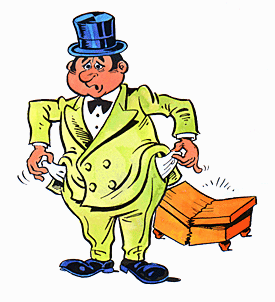
A click on the image will take you to the series of illustrated quizzes which will appear in random order or you may click on this image quiz link.
Originally, a banker became bankrupt because his bench was broken when he lacked the necessary funds to continue with his money business as an early "banker".
2. Any insolvent debtor; a person, or organization, that is unable to satisfy any justified monetary claims made upon it: "As a result of being bankrupt, the company went out of business."
3. A person who is totally lacking in a specified resource or quality: "Jerome was considered to be intellectually bankrupt."
4. Etymology: from Italian banca rotta, from banca "moneylender's shop"; litterally, "bench" + rotta "broken, defeated, interrupted" from (and remodeled on) Latin rupta, past participle of rumpere "to break".

Being bankrupt or insolvent started long before our modern times
The original meaning in Italian was the ruin or breaking up of a trader's business because of his failure to pay creditors, or the abandonment of business to avoid paying debts. The modification of this sense to mean "an insolvent person" is peculiar to English.
In medieval times, Italian moneylenders used a small bench in the markeplace to conduct their business. The Latin word for such a bench, banca, is in fact the source for the English word bank. These money lenders, the "bankers" of their day, were required to break up their benches if they failed in business.
The term bankrupt appeared in 1543 and was borrowed through Middle French banqueroute, and directly from Italian banca rotta, "bankruptcy" (literally, "bank broken"; rotta from rompere, "to break", from Latin rumpere, "to break"; the modern form -rupt is an alteration of Medieval Latin ruptus, "broken", and as a noun meaning "a bankrupt"), later became the English word bankrupt.
2. To ruin: "The newspaper had an administration that bankrupted its credibility by seeking to manipulate the news."
